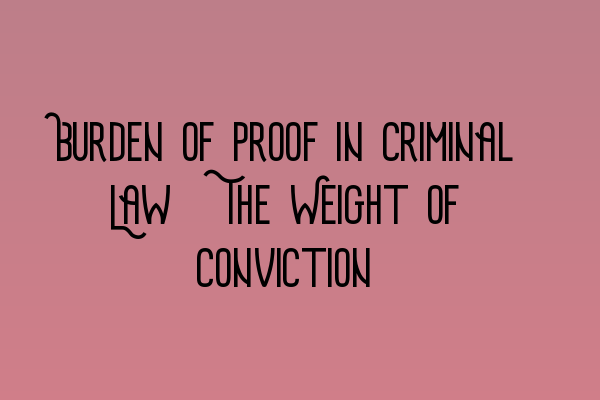Burden of Proof in Criminal Law: The Weight of Conviction
As a criminal solicitor, one of the fundamental aspects of your work is understanding the burden of proof in criminal law. The burden of proof refers to the responsibility of proving the guilt or innocence of the accused beyond a reasonable doubt. This concept holds immense importance as it ensures the fair administration of justice, safeguarding the rights of both the accused and the victims.
In criminal proceedings, the prosecution carries the burden of proof. They must demonstrate that the accused committed the crime with the necessary level of certainty. The exact standard of proof may vary depending on the jurisdiction and the nature of the offense, but it is typically “beyond a reasonable doubt.” This standard is higher than the civil standard of “balance of probabilities.”
The burden of proof serves as a safeguard against the potential abuse of power by the state. It ensures that individuals are not wrongfully convicted based on mere suspicion or speculation. The prosecution must present credible and compelling evidence to convince the court of the accused’s guilt.
The Presumption of Innocence
A crucial principle in criminal law is the presumption of innocence. Until proven guilty, every accused person is presumed innocent. This presumption requires the prosecution to overcome the burden of proof by presenting evidence that establishes guilt beyond a reasonable doubt.
When working on criminal cases, it is essential for solicitors to recognize the importance of maintaining this presumption throughout the proceedings. The presumption of innocence ensures fairness and prevents prejudice from influencing the outcome of the case.
Evidential and Legal Burden of Proof
Within the burden of proof framework, it is crucial to distinguish between evidential and legal burdens. The evidential burden relates to the requirement for the prosecution to present sufficient evidence to establish a prima facie case against the accused. Once the prosecution meets this threshold, the legal burden switches to the accused to offer a credible defense.
Understanding the difference between evidential and legal burdens is essential in criminal defense. As a solicitor, it is your responsibility to guide your clients through these distinctions and ensure they comprehend the burden of proof placed upon them.
Challenging the Burden of Proof
Throughout the course of a criminal trial, solicitors have numerous opportunities to challenge the burden of proof. This can be done through various legal strategies and tactics, such as cross-examining witnesses, introducing expert testimony, or presenting alternative theories of the crime.
By challenging the burden of proof, solicitors aim to create doubt in the minds of the jury, emphasizing the importance of maintaining the presumption of innocence. It is crucial to construct a strong defense that exposes weaknesses in the prosecution’s case and casts doubt on their ability to meet the required standard of proof.
Conclusion
Mastering the concept of the burden of proof in criminal law is essential for solicitors practicing in this field. It protects the rights of the accused, upholds the presumption of innocence, and ensures the fair administration of justice. By understanding the evidential and legal burdens, solicitors can effectively challenge the burden of proof and strive for the best possible outcome for their clients.
For SQE 1 practice exam questions, SQE 1 practice mocks FLK1 and FLK2, SQE 2 preparation courses, SQE 1 preparation courses, and SRA SQE exam dates, please visit the following links:
- SQE 1 Practice Exam Questions
- SQE 1 Practice Mocks FLK1 FLK2
- SQE 2 Preparation Courses
- SQE 1 Preparation Courses
- SRA SQE Exam Dates
